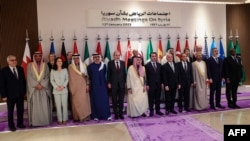From the outset, the Biden administration's primary goal in the Middle East was to establish a more integrated region, said Secretary of Antony Blinken in his final speech as Secretary of State to the Atlantic Council.
But this policy was abruptly interrupted when on October 7th, Hamas attacked Israel, unleashing the deadliest days for Jews since the Holocaust.
The timing of this attack was no accident, said Secretary Blinken.
“Israel's growing integration in the region, the prospect of normalization with Saudi Arabia posed an existential threat to Hamas's power, its ambitions to dominate the Palestinian political landscape, its raison d'etre, which is the rejection of two states and the destruction of Israel.”
Iran launched two missile attacks on Israel which were thwarted by a coalition of regional partners that the U.S. assembled, said Secretary Blinken.
“Israel's response, which we played a central role in shaping, demolished Iran's air defenses, left Iran's most sensitive military sites exposed and vulnerable, and sent a clear message of deterrence while at the same time avoiding a dangerous escalatory cycle. Hezbollah, Iran's most powerful proxy, is a shadow of its former self. Its leadership eliminated its terrorist infrastructure of tunnels and weapons manufacturing ravaged.”
Moreover, with the fall of the Assad regime, Tehran has retreated from Syria. Iran has lost its overland supply route to Hezbollah. Many of the Assad regime's bases, weapons, and factories, including illegal chemical weapons, have been destroyed by Israel.
The balance of power in the Middle East is shifting dramatically, said Secretary Blinken. Yet, he warned that the region remains rife with risk from Syria's fragile political transition to Iran's desperation to restore its deterrence, to the Houthis ongoing attacks on Israel and international shipping.
“Given the costs, especially the human costs,” said Secretary Blinken, “we have a responsibility to ensure that the strategic gains of the last 15 months endure and lay the foundation for a better future.”
“So, the imperative is not to turn back the clock to the way things were before October 7th. It is to forge a new reality for the Middle East in which all people are more secure, all can realize their national aspirations. All can live in peace.”






